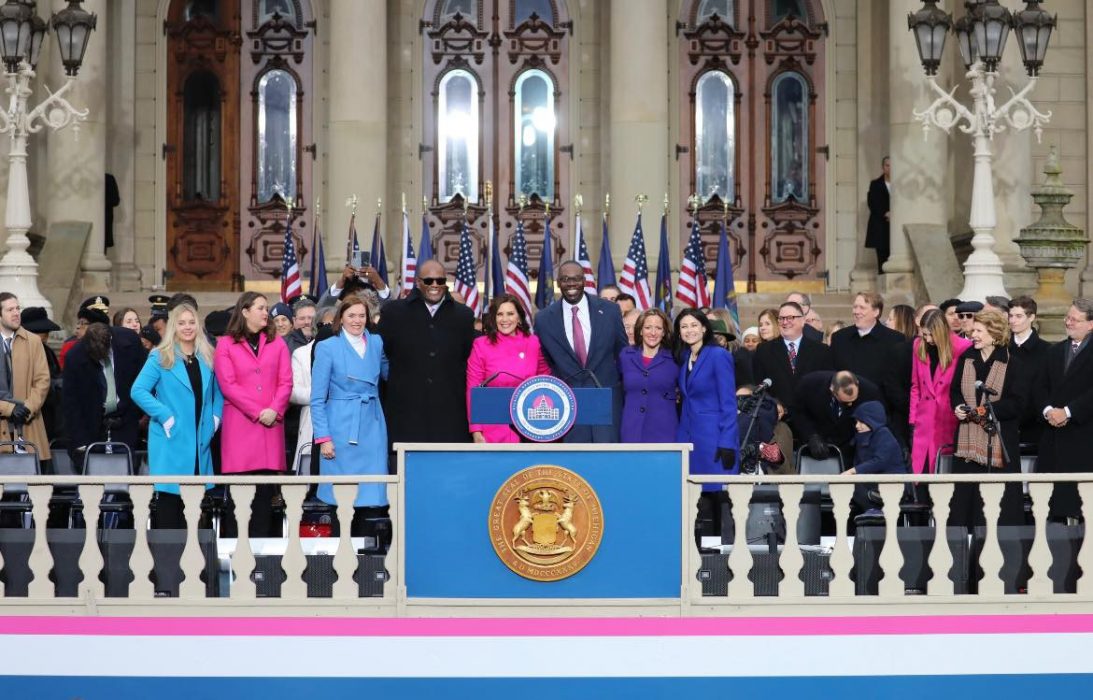
Article courtesy MIRS News for SBAM’s Lansing Watchdog e-newsletter
During her second inauguration ceremony, the Governor described her four-year vision as including bigger savings for seniors, making Michigan an “epicenter of innovation” and officially revoking old laws, like those surrounding abortion and LGBTQ issues.
“We can make Michigan a place where all people can envision a great future – no matter who they are, where they come from or how much money they have in their pocket,” said Gretchen Whitmeras part of the formal event that kicked off her second term in office.
A line of dark pink was wrapped around the inauguration stage, and hundreds of individuals covered the Capitol lawn. Many of them wore bright pink beanies reading “Michigan Strong,” which was the ceremony’s title.
On stage, Whitmer was sworn in by the Michigan Supreme Court’s latest justice – as well as its first Black female justice – Kyra Bolden (D-Southfield), who officially took her oath of office the morning after Whitmer announced her plans to appoint her near the end of 2022.
Lt. Gov. Garlin GilchristII, Attorney General Dana Nesseland Secretary of State Jocelyn Bensonwere also sworn in, along with members of the Michigan Supreme Court, the state Court of Appeals and other statewide office holders who won their Nov. 8 elections.
Throughout Sunday morning’s festivities, there were multiple nods toward the Democrats’ takeover of the state Legislature, with Democratic candidates winning 20 of the Michigan Senate’s 38 seats and 56 of the House chamber’s 110 spots.
U.S. Sen. Debbie Stabenow highlighted the new legislative majority in her speech, stating she’s excited “about what this means for the strong partnership our state has with President (Joe) Bidenand our federal delegation.”
Former Gov. James Blanchard, the last governor to serve with both a Democratic-led House and Senate (before the Senate flipped and remained under Republican leadership from 1984 until this year), was also present at the ceremony.
“A stunning opportunity stands before us to work together like never before across legislative chambers and alongside the executive branch,” said new Senate Majority Leader Winnie Brinks (D-Grand Rapids) during a joint presentation with the latest House Speaker, Joe Tate (D-Detroit).
Bringing a “heartfelt congratulations” to Whitmer on behalf of the Senate, Brinks said she is proud to stand alongside the Governor, possessing confidence in Whitmer’s “strength and courage to meet the challenges and the tasks before her.”
“It is with gratitude to the voters that have placed their trust in us that we embrace this opportunity to move in unison to improve the lives of the people of Michigan,” Brinks said. “As we celebrate this powerful moment together, we do so ever mindful that true unity is directly correlated to the strength we draw from the diversity of our great state.”
Expanding on her preview sheet of policy goals, adding that she’ll “have a lot to say” in the upcoming State of the State address, Whitmer listed off wanting to see more record-making investments in education from preschool to the post-secondary level, to pursue gun policy reforms and to ensure worker access to quality health care and great benefits.
“Over the next four years, we must do everything we can – so we lower costs for families, so we can add more money in their pockets to take care of their bills and put food on the table. We need to grow our economy so that every single person can get the skills and land a good-paying job,” Whitmer said. “Our task is clear – focus on the fundamentals, work together and get things done.”
One of the Capitol’s visitors was 54-year-old Tony Braggs, a member of the United Auto Workers’ (UAW’s) Region 1A in Taylor.
He described himself as a Democratic activist. When it came to his New Year’s policy desires, he told MIRS that he would like to see a repeal of Michigan’s Right-to-Work law.
He would also like to see reform on retirement taxes in Michigan.
“What brought me here today is that this is a great day in history with the Michigan Democratic Party,” Braggs said. “To have our governor (elected) for a second term – it’s a good thing for the state of Michigan, it’s a good thing for the UAW and it’s a great thing for the middle class…so we’re looking forward to some of the things that’s coming down the pipeline that kind of fits the middle class – the working people.”
Another attendee was LGBTQ advocate Christina Rissman, a 27-year-old from Warren who moved to Washington, D.C. after the recent election.
She described her canvassing work for the 2022 election cycle as being full of “constant panic all the time,” especially when wondering what election operations could look like after the Jan. 6, 2021 riot in the U.S. Capitol.
“…and like, whether or not we would be able to carry on normalcy and the democratic process – but Michigan made it happen in 2020, and they made it happen this year, and we have a great Secretary of State obviously who’s overseeing all of our voting processes and making sure that things go as simple as possible and that we have secure and free elections,” Rissman said. “Michigan held it down and did what needed to be done.”
As for what policy modifications she would like to see in 2023, Rissman said a statewide non-discrimination protection for LGBTQ folks would be great.
“Now that we got kind of the trifecta going here in Michigan, we’re hopeful that that will finally happen,” Rissman said, referencing the call to expand the state’s Elliott-Larsen Civil Rights Act to protect LGBTQ individuals. “Michigan’s always been the leader on a lot of these different fights, and so hopefully that’s the case for this.”
After the event, visitors could check out an array of activities, such as a heated tent full of music and refreshments, a performance from dancing roller skaters and ice sculpture displays alongside Capitol Avenue.